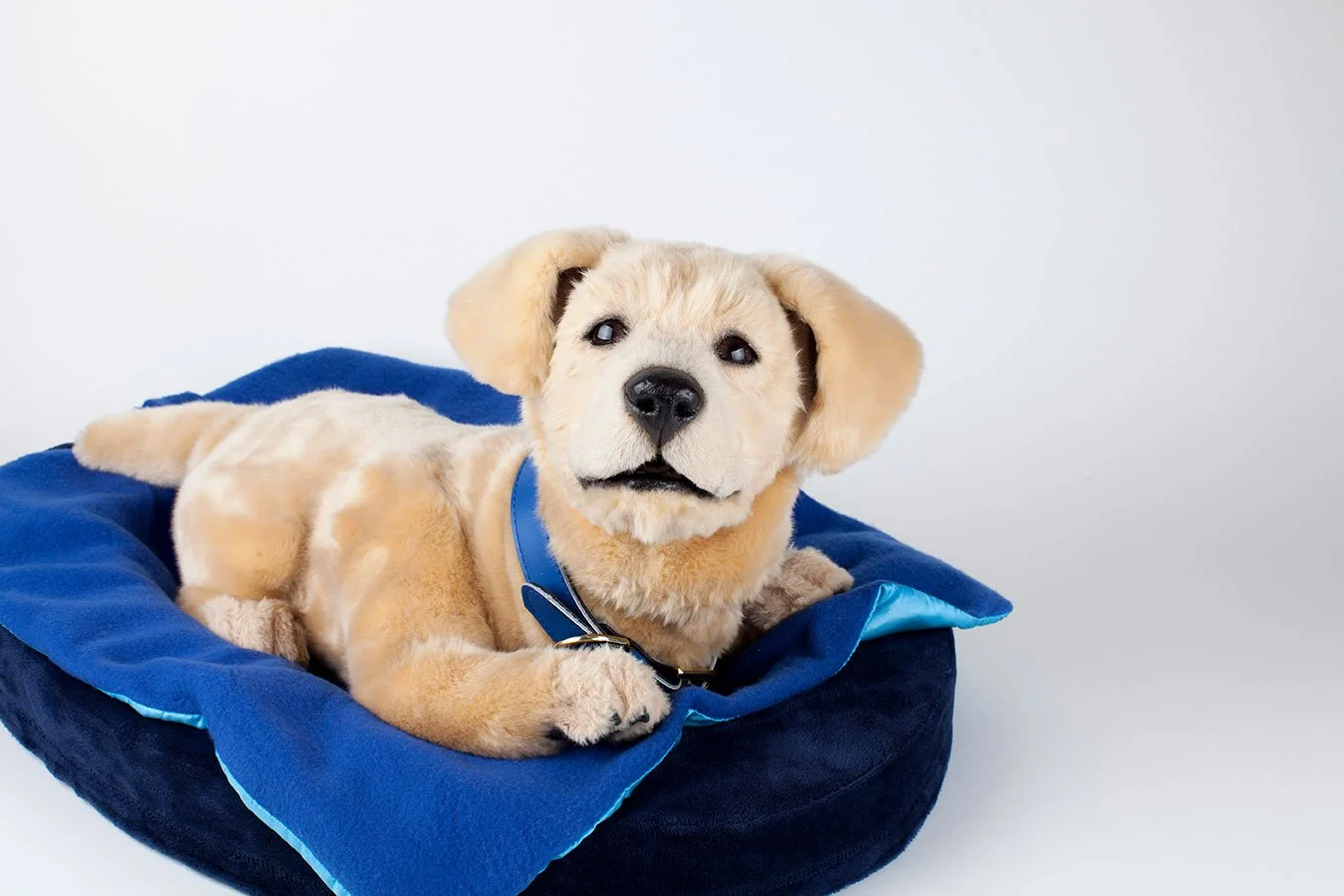Canine Companion
Jennie is a lifelike companion who comforts seniors with dementia. (Photo courtesy of Tombot)
Puppy love at its artificial best, Jennie was created to comfort and soothe seniors with dementia safely and affordably. However, its cutting-edge technology and lifelike charms could be more far-reaching.
According to co-founder and CEO Tom Stevens, Tombot, a California-based leader in robotic animal companions and digital health solutions, developed the groundbreaking, AI-powered device for individuals facing the myriad challenges associated with the debilitating syndrome at home, hospitals or care facilities worldwide.
Hyper-realistic Labrador Retriever puppy, with its silky coat, floppy ears, soulful eyes and a button nose that invites playful booping, Jennie appears set to become the growing robotic-pet industry's pick of the litter. More than 17,000 customers from 116 countries have pre-ordered the exhaustively researched and meticulously designed device, with some individuals and facilities having been on the waitlist since 2019, when Tombot launched its first marketing campaign and sold out its inventory in just seven hours.
“We conducted three rounds of customer studies and created five generations of high-fidelity robotic animals until we got to the Jennie that you see on our website and in our videos,” says Stevens. “Of the many things we learned through our research, the most important takeaways were the need for realism.”
For the love of Mom
Stevens says there would be no Jennie without his mother, Nancy.
“I've been in high tech my whole career. My two Tombot co-founders and I built a prior startup into one of the world's largest litigation automation companies. We were successfully acquired, which gave me the financial freedom to explore other things,” recalls Stevens. “Unfortunately, my mom gave me my new purpose after she was diagnosed with Alzheimer's dementia, and I had to take away her dog for safety reasons."
After her dog, a Goldendoodle named Goldenbear, was rehomed, Nancy Stevens was distraught and upset with her son. Stevens not only witnessed her increasing loneliness and depression but also experienced all the emotions of a caregiver dealing with a parent who had been previously fully independent.
It launched what Stevens called “a multi-year research and education journey” that culminated in his receiving a master's degree from Stanford University in addition to his B.A. in political science and government from UCLA.
“I realized the large gap in the market when we began looking for substitutes for live animal companions. Nancy did not like anything available,” he says. “It helped me to understand the tremendous need for what we are doing now.
“I learned that my mom's story is shared by hundreds of millions of other seniors with dementia or pre-dementia, mild cognitive impairment,” he says. “We launched Tombot to serve those people, and my mother.'
Founded in 2017 and named by Nancy Stevens, Tombot's mission is to create a robotic companion that could provide the emotional benefits of pet ownership without the typical associated challenges.
“Even in the later stages of dementia, she couldn't tell me what she had for breakfast on a given day, but she always remembered that I was working on robots for her. It's what she wanted to talk about,” Stevens recalls.
His mother tested all of the early prototypes. She loved them and used them at home and in the hospital after she fractured her leg in a fall.
Nancy Stevens was 83 when she died in 2018.
According to Tombot, peer-reviewed studies have shown that robotic animals can reduce the behavioral and psychological symptoms of dementia — depression, hallucinations and aggressive outbursts — thereby reducing the need for dangerous psychotropic medications.
Though Tombot developed the prototype specifically for seniors with dementia, Stevens notes that 71% of its orders are for children with autism, intellectual and developmental disabilities; adolescents with severe anxiety, depression, substance abuse disorder, suicide risk; adults with PTSD, bipolar, schizophrenia, OCD, ADHD; and adults and seniors who are otherwise healthy but are at-risk for social isolation and severe loneliness.
Stevens says he hopes to help all of these people and others.
Aiming to be the first robotic puppies to be FDA-registered medical devices, Tombot's vision extends well beyond providing emotional support.
“There is a lot of technology beyond just what it takes to be a robotic puppy,” Stevens says.
Muppet-like charm
On the outside, Jennie's lifelike appearance is credited to collaboration with Jim Henson's Creature Shop, creators of the iconic Muppet characters, who also came up with the name. Jennie, all of six-and-a-half pounds, will be marketed in the Lab's natural four color options: yellow, black, chocolate and silver.
Inside, Jennie is a mix of interactive technologies designed to create a lifelike companion experience. Jennie looks, feels and behaves like a real puppy, thanks to:
• Interactive touch sensors that respond to touch
• Voice command recognition that allows Jennie to bark when told to speak.
•Authentic puppy sounds based on real recordings of 8 to 10-week-old Labrador retriever puppies
•A rechargeable battery that provides for all-day companionship
An optional smartphone app provides users with extensive customization options. Owners can rename their Jennie and personalize its commands. Committed to continuous improvement, Tombot will offer regular software updates to ensure Jennie remains up-to-date.
In response to the daily inquiries about production schedules, Tombot, as of June, was on course to begin shipment for clinical studies by the end of 2025 and customer deliveries in the first half of 2026.
Jennie retails for about $1,500, with financing options available for individuals, and various pricing models for B2B customers including assisted living, skilled nursing and major hospital systems. For more information, visit the Tombot website, tombot.com.
Looking ahead, Tombot will explore marketing other dog breeds and a robotic cat for the feline lovers.

